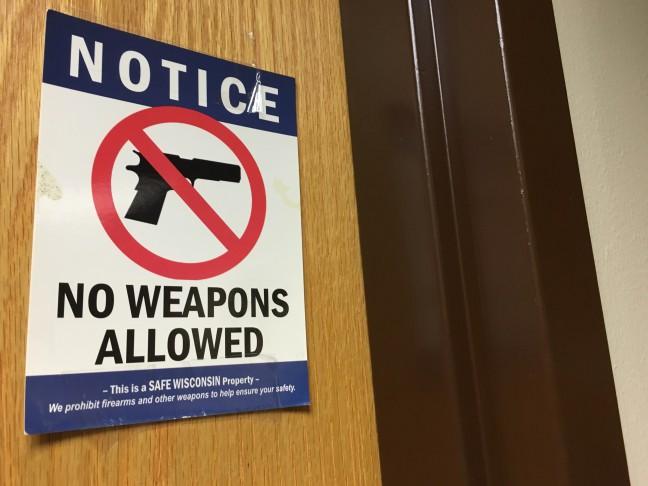Gun sales have consistently peaked at both the national and state levels after mass shootings occur, experts suggest.
As of Nov. 29, 35,294 concealed carry weapon licenses were approved in 2015 — up almost 2,000 since the same time last year, Anne Schwartz, spokesperson for Wisconsin Department of Justice, said in an email.
Schwartz said handgun background checks in Wisconsin set a new one-day record on Black Friday this year with 1,752 total. The previous record occurred Dec. 21, 2012 — one week after the Sandy Hook mass shooting — with 1,542 checks.
Brian Rafn, who follows the gun industry as principal and director of research for Morgan Dempsey Capital Management in Menomonee Falls, said because hunting is such a popular activity in Wisconsin, it is one of the most gun-owning states in the country.
“I imagine Wisconsin would be certainly in the top third of the country, and we’re nowhere near the top third by population,” Rafn said.
Democrats propose bill to ban guns everywhere on college campuses
Rafn said since 9/11, gun sales across the country have gone up by about 400 percent.
These dramatic increases seem to come in reaction to mass shootings, such as the San Bernardino shooting Dec. 2, Rafn said. Political rhetoric that follows mass shootings often brings up talk of tighter gun control policies, which may also lead some people to rush into buying more guns before potential restrictions would be put in place, Rafn said.
Rafn said the backlash from groups like the National Rifle Assocation and other citizens who want to own guns stems less from gun control policy, but instead from tougher restrictions on gun registration, seizures and confiscation.
Because mass shootings seem to be happening in unsuspecting places, Rafn said, Americans have turned to buying guns out of fear.
“This is probably a little more fear from the standpoint of this could happen in any location — urban, suburban, rural — anywhere in the United States,” Rafn said.
Rick LaMere, manager of Central Wisconsin Firearms, said gun sales have increased at his business.
Besides buying guns for sport, LaMere said people seem to have other motivations for their purchases.
“In some areas, people are becoming more and more uncomfortable with their surroundings, and they just want to make sure they can protect themselves,” LaMere said.
Andrew Kydd, University of Wisconsin political science professor and expert on terrorism, said people seem to think that guns will protect them from mass shootings, but that is not necessarily the case.
Kydd said people likely imagine themselves in a scenario of a mass shooting where no one has a gun to defend themselves, whereas if they did, they would be able to stop the shooter.
But logistically, such a scenario could cause problems, Kydd said. If police entered a scene where multiple shooters were firing, an officer might shoot an innocent person by accident.
Kydd also said gun owners are prone to more gun-related accidents and violence resulting in unwanted deaths, such as children or mentally unstable members of one’s family using guns for inappropriate reasons.
Kydd said improving background investigations and trying to prevent people who have any signs of mental illness or violence from obtaining guns are ways to prevent guns from getting in the wrong hands.
“I don’t think buying guns or promoting open or concealed carrying of guns is a particularly effective response to this problem,” Kydd said. “If you are concerned about mass killings … then I think it would be somewhat more rational to attempt to restrict who has access to guns.”













